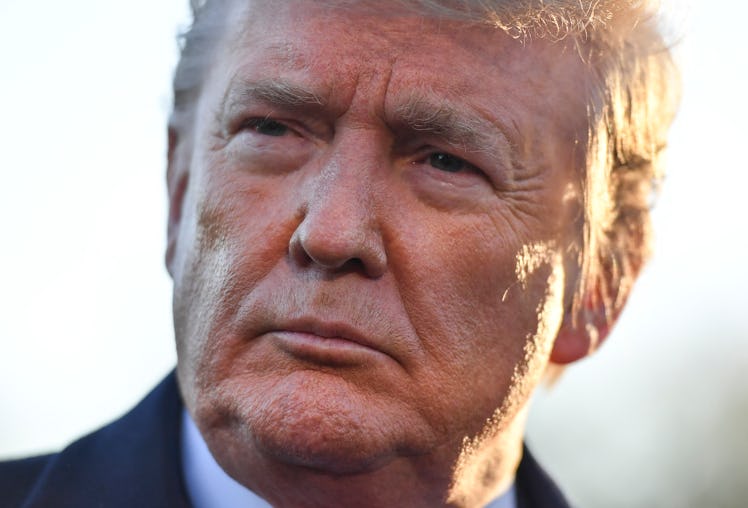
Here's Who Would Run An Impeachment Trial Against Trump
The impeachment inquiry into President Donald Trump continues to heat up by the day, but Democrats are still a long road away from actually impeaching him. Impeachment is a long process, and the public hearings that House committees are organizing will lay the groundwork for articles of impeachment against Trump. But what happens if the House does vote to impeach him? The case will move to the Senate, which will run an impeachment trial.
There are two distinct phases in the impeachment process: the House's vote on whether to impeach the president, and the Senate's vote on whether to remove the president from office. Right now, the House has a Democratic majority, and impeaching a president only requires a simply majority vote of greater than 50%. Because of this, it is a definitely possibility that the Democrats will be successful in impeaching Trump. It does not, however, guarantee that Trump will be removed from office.
After the House votes to impeach a president, the Senate is tasked with organizing a trial. Think of it this way: The House can vote to charge the president with impeachment, but it is the Senate that must convict him on that charge in order for him to be ousted from office. In order for Trump to be removed from office after being impeached, two-thirds of the Senate must vote for his removal — and the Senate has a Republican majority, which may make it difficult for Democrats to get Trump removed from the White House. In fact, Politico reported that Senate Majority Leader Mitch McConnell has already expressed his confidence that the Senate will vote to acquit Trump.
So, how does a Senate impeachment trial work? Once the House votes to approve one or more articles of impeachment against Trump, the case will move to the Senate. The Senate will be tasked with organizing a formal impeachment trial to determine whether Trump committed "high crimes and misdemeanors" that would warrant his removal from the White House. However, we won't see McConnell or Vice President Mike Pence presiding over the impeachment trial. Instead, the Constitution dictates that the chief justice of the Supreme Court is responsible for presiding over impeachment trials in the Senate.
It is much harder to remove a president from office than it is to impeach them. Former Presidents Bill Clinton and Andrew Johnson provide the perfect example. Both presidents were impeached in the House, but were acquitted during their formal impeachment trials in the Senate and were able to remain in office the remainder of their presidential terms.
There was speculation that Senate Republicans would find a way around organizing an impeachment trial, but McConnell and other GOP senators held a meeting in October to put that speculation to rest. During the meeting, McConnell explained how the Senate's impeachment trial would work; it would run six days a week with only Sundays off, per BuzzFeed News. Supreme Court John Roberts would be the judge, House lawyers would act as prosecutors, and White House lawyers would serve as Trump's defense counsel.
Senate Republicans may reluctantly be on board with the their chamber's impeachment responsibilities, but progressive voters shouldn't get too excited. Given the Senate's GOP majority and McConnell's unwillingness to oppose Trump — despite his numerous political personal disagreements with the president — it is entirely possible that Americans will have to rely on the ballot box to remove Trump from the White House.